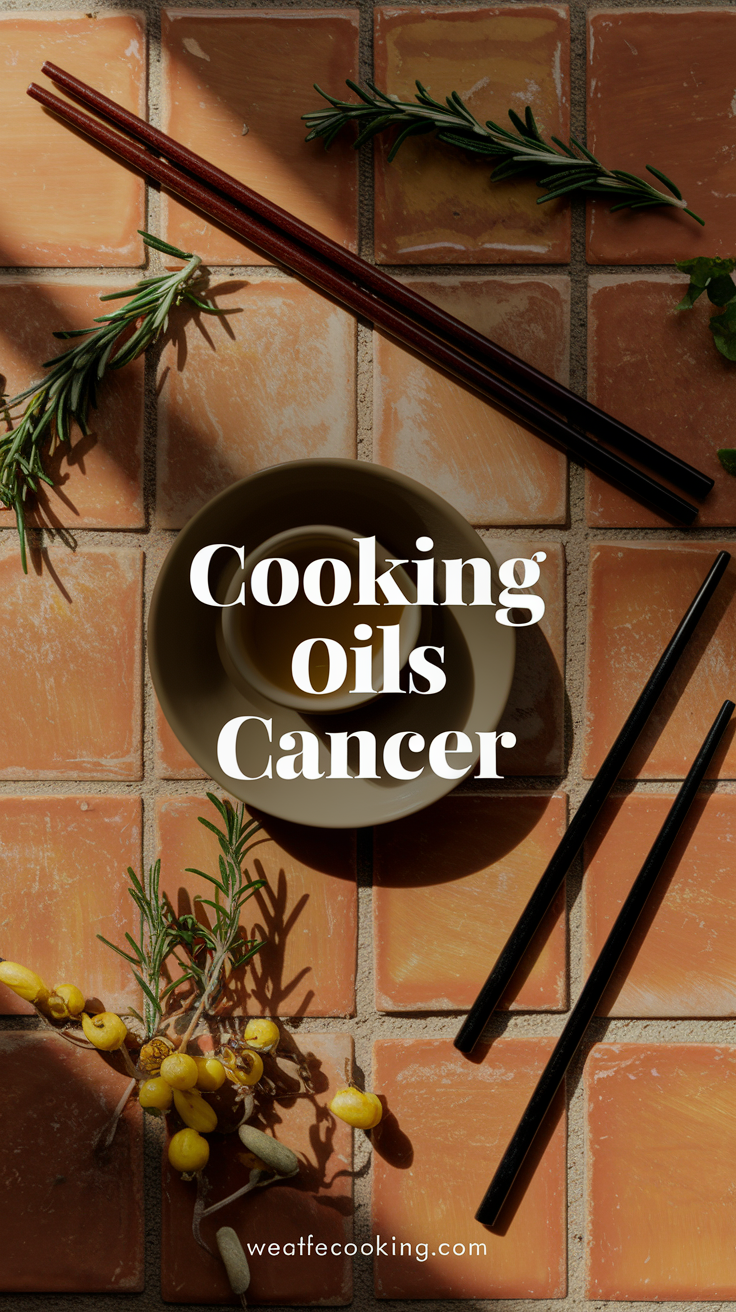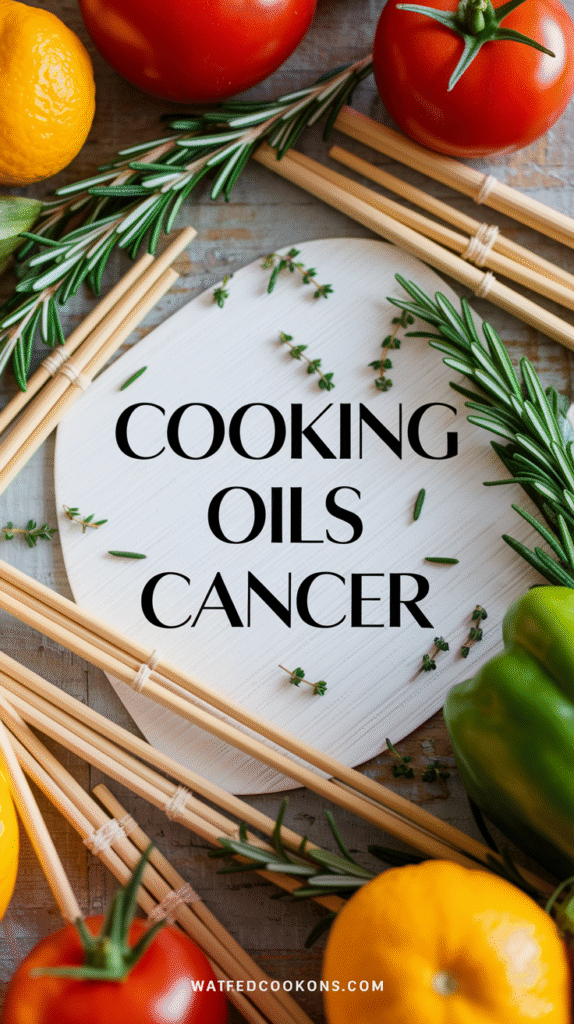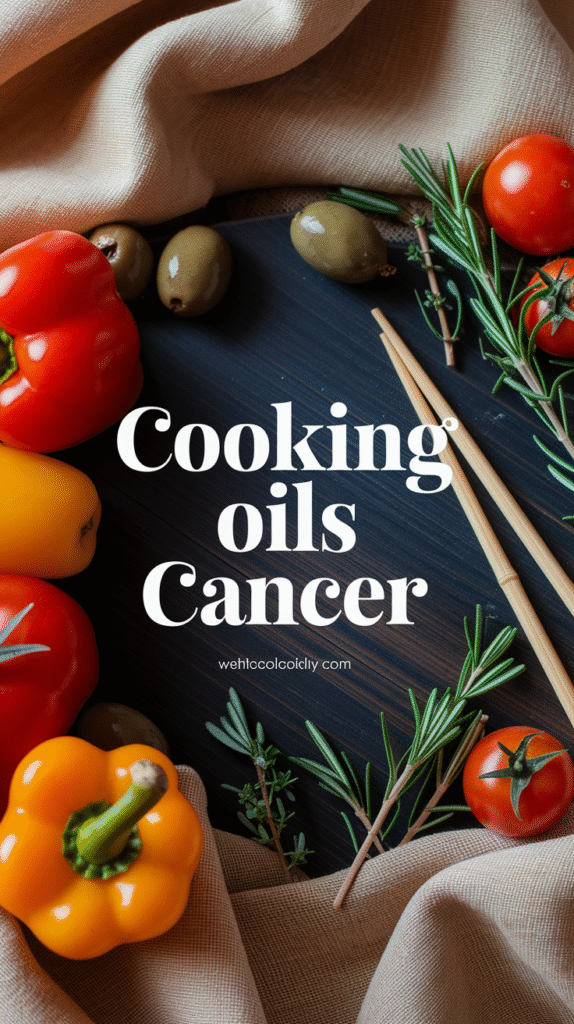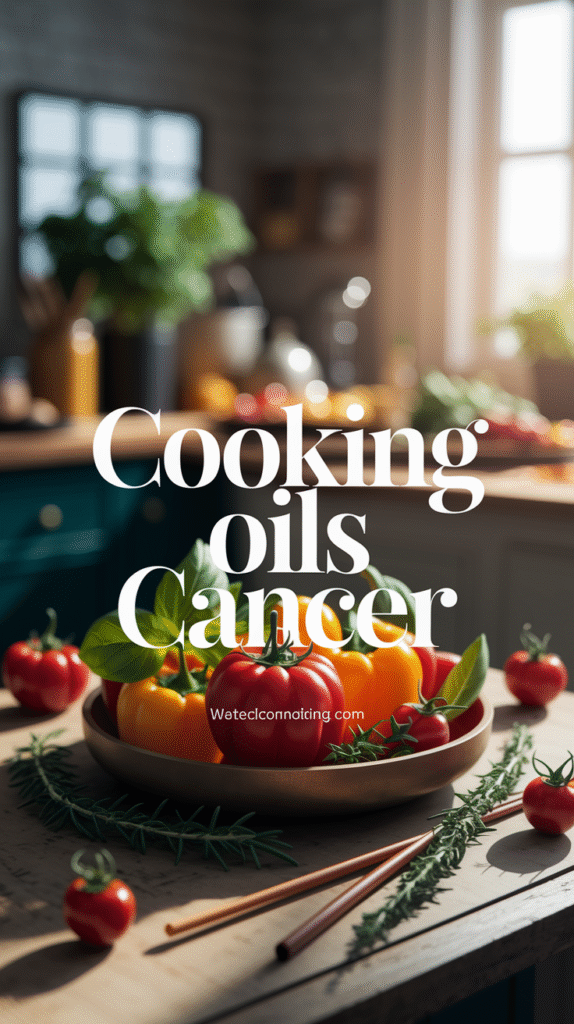Cooking oils are a staple in kitchens around the world, but their relationship with health, particularly cancer risk, is an area of growing concern. Understanding how different cooking oils may impact your health is vital for making informed dietary choices.
Many people opt for vegetable oils due to their perceived health benefits. However, not all oils are created equal. Some oils can produce harmful compounds when heated, which may pose risks for cancer development. It’s essential to distinguish between types of cooking oils and their chemical properties to understand their effects on health.
Common Types of Cooking Oils
- Olive Oil: Often considered a heart-healthy option, olive oil contains monounsaturated fats and antioxidants. Studies suggest it may even reduce cancer risk.
- Canola Oil: Canola oil has a favorable omega-3 to omega-6 fatty acid ratio. However, when refined, it can lose beneficial properties.
- Coconut Oil: High in saturated fats, coconut oil is controversial. Some research indicates it may not increase cancer risk, but other studies question its effects.
- Vegetable Oil: This term generally encompasses various oils. Depending on the source, some may be unhealthy due to high omega-6 fatty acids.
- Sunflower Oil: Rich in polyunsaturated fats, sunflower oil can be prone to oxidation, which may lead to harmful compounds.
The Science Behind Cooking Oils and Cancer
Cooking oils undergo processes such as refining, bleaching, and deodorizing. These processes can alter their chemical structure, especially when subjected to high temperatures. Here are a few mechanisms through which cooking oils may influence cancer risk:
- Oxidation: Heating oils can lead to oxidation, forming harmful compounds, including free radicals. Free radicals can damage DNA, potentially leading to cancer.
- Trans Fats: Some oils, when artificially hardened, create trans fats. Studies show that trans fats contribute to cancer risk.
- Smoke Point: Oils have different smoke points, the temperature at which they start to smoke. Exceeding this point can create toxic compounds. For instance, extra virgin olive oil has a higher smoke point than many other oils.
Choosing the Right Cooking Oil
To minimize cancer risk, opt for oils with a higher nutritional value and a better fat profile. Here are some tips for selecting the best options:
- Prioritize unrefined oils: These oils often contain beneficial nutrients that refined oils lack.
- Use oils with high smoke points for frying: Avocado oil and peanut oil are suitable candidates.
- Limit the use of oils high in omega-6 fatty acids: Canola and corn oils should be used sparingly.
- Incorporate oils rich in antioxidants: Extra virgin olive oil and flaxseed oil help combat oxidative stress.
Research and Recommendations
Several studies highlight the importance of cooking oil choices in cancer risk. For instance, research from the National Cancer Institute emphasizes that a diet rich in omega-3 fatty acids—with low levels of omega-6—can be beneficial in reducing inflammation and possibly lowering cancer risk. Furthermore, the National Institutes of Health has examined how certain cooking oils contribute to oxidative stress related to various cancers.
Moreover, it’s not just the oil you choose, but how you use it. Regularly using fresh oils and storing them properly can help retain their health properties. For instance, protecting them from light and heat can prevent them from going rancid and producing harmful compounds.
Cooking oils have a significant impact on cancer risk, making it crucial to choose wisely. By selecting high-quality oils, understanding their properties, and using them properly, you can minimize potential health risks. Always consider your overall diet and lifestyle, as they contribute to your long-term health and wellness.
For more information on healthy cooking oils and their effects, you can explore resources such as the Healthline and WebMD.
Understanding the Health Benefits of Different Cooking Oils
Cooking oils play a significant role in our daily diet, providing essential fatty acids and nutrients that contribute to overall health. With numerous options available, understanding the health benefits of various cooking oils is crucial for making informed choices. Whether you are sautéing vegetables, baking, or dressing a salad, the type of oil you choose can impact not only the flavor of your dish but also its nutritional value.
Olive Oil
One of the most popular and widely studied cooking oils is olive oil. Rich in monounsaturated fats, olive oil is renowned for its heart-health benefits. Studies suggest that it may help reduce the risk of heart disease and stroke due to its anti-inflammatory properties and ability to lower bad cholesterol levels.
- High in antioxidants, which can combat oxidative stress.
- May improve blood sugar levels and insulin sensitivity.
- Supports brain health by protecting against cognitive decline.
Coconut Oil
Coconut oil has gained traction in recent years, touted for its unique health properties. Unlike most fats, it contains medium-chain triglycerides (MCTs), which can be easily converted into energy. This oil is also popular in many cooking styles, especially in baking and frying.
- May boost metabolism and promote weight loss.
- Has antimicrobial properties that can support gut health.
- Can enhance the absorption of fat-soluble vitamins and minerals.
Avocado Oil
Avocado oil is another excellent option, particularly for high-temperature cooking methods like frying and grilling, due to its high smoke point. Rich in monounsaturated fats, it mimics the health benefits of olive oil.
- Contains lutein, important for eye health.
- Can aid in nutrient absorption from plant foods.
- May provide anti-inflammatory benefits and promote healthy skin.
Canola Oil
Canola oil is often considered a heart-healthy oil due to its low saturated fat content. It is versatile and can be used in a variety of cooking techniques. Yet, there are debates about whether the refining process diminishes its health benefits.
- Rich in omega-3 fatty acids, which are beneficial for heart health.
- May help reduce inflammation in the body.
- Contains antioxidants that combat free radicals.
Flaxseed Oil
Flaxseed oil is a plant-based source of omega-3 fatty acids, which are essential for overall health, especially for heart and brain function. However, this oil is not suitable for cooking at high temperatures due to its low smoke point.
- Supports cardiovascular health and may lower blood pressure.
- May help reduce symptoms of arthritis and promote joint health.
- Can improve skin hydration and overall appearance.
Sesame Oil
Sesame oil, commonly used in Asian cuisine, offers a unique flavor and numerous health benefits. It contains both mono- and polyunsaturated fats, making it a heart-healthy choice. Additionally, sesame oil is rich in antioxidants that can contribute to overall wellness.
- May help lower blood pressure and improve heart health.
- Contains sesamolins, which may help reduce cholesterol levels.
- Supports skin health due to its moisturizing properties.
When choosing a cooking oil, consider its health benefits and how it fits into your overall diet. While all oils have their benefits, moderation is key as they are calorie-dense. By incorporating a variety of these oils, you can enhance your meals and support your health in numerous ways.
For further information about the health benefits of cooking oils, visit reputable sources like Healthline or NCBI.
How to Choose Cooking Oils for Healthy Cooking
When it comes to healthy cooking, the choice of cooking oils can significantly impact your overall health. With so many options available in stores, it can be challenging to determine which oils are best for your culinary needs. To guide you through the selection process, consider the following factors that will help you make an informed decision.
Understand Different Types of Cooking Oils
There are several categories of cooking oils, and each has distinct properties that affect cooking applications and health benefits. Here’s a rundown:
- Monounsaturated Fats: These oils are beneficial for heart health. Examples include olive oil and avocado oil.
- Polyunsaturated Fats: These include omega-3 and omega-6 fatty acids, found in oils such as flaxseed and sunflower oil.
- Saturated Fats: While limited consumption is advisable, oils like coconut oil and palm oil are in this category.
- Trans Fats: These should be avoided, as they can contribute to heart disease. Partially hydrogenated oils fall under this category.
Look for High Smoke Points
The smoke point of an oil indicates the temperature at which it begins to smoke and break down. Using oils with high smoke points for high-heat cooking methods like frying is crucial. Here are some oils to consider:
| Oil | Smoke Point (°F) | Best Uses |
|---|---|---|
| Avocado Oil | 520 | Grilling, frying |
| Coconut Oil | 350 | Baking, sautéing |
| Canola Oil | 400 | Sautéing, baking |
| Olive Oil (Refined) | 465 | Roasting, frying |
Consider Nutritional Value
When selecting cooking oils, pay attention to their nutritional content. Here are some oils packed with health benefits:
- Extra Virgin Olive Oil: Rich in antioxidants and anti-inflammatory properties, this oil is great for salad dressings and low-heat cooking.
- Flaxseed Oil: A vegan source of omega-3 fatty acids, perfect for drizzling on salads.
- Walnut Oil: Another good source of omega-3s, walnut oil adds a delightful flavor to dishes but should be used cold.
Avoid Processed Oils
Many commonly used cooking oils, like vegetable oil and soybean oil, undergo extensive processing. These oils often contain additives and may contribute to inflammation. Instead, opt for oils that are minimally processed or cold-pressed for better health outcomes.
Beware of Health Claims
Some oils may be marketed with buzzwords like “heart-healthy” or “natural.” It’s essential to read labels carefully. Terms can often be misleading. Aim to choose oils that are certified organic or labeled as cold-pressed, as these are likely to be healthier choices.
Storage and Freshness Matters
The storage of cooking oils is also crucial. Oils can go rancid if not stored properly. Follow these tips:
- Keep oils in a cool, dark place to prevent oxidation.
- Store oils in tightly sealed containers to maintain freshness.
- Check expiration dates, and eliminate oils that have developed an off smell.
The right cooking oils into your diet can lead to healthier meal preparations and potentially lower your cancer risk. For further information about cooking oils and health, visit Healthline or explore more on WebMD.
Ultimately, choosing the right cooking oil involves understanding its fat composition, smoke point, nutritional value, and how to store it properly. Making informed choices will enhance both your dishes and your health.
Myths and Facts About Cooking Oils and Cancer
When it comes to selecting cooking oils, many people are unsure about their health effects, particularly regarding cancer. The relationship between cooking oils and cancer is often clouded by myths and misinformation. Here we will clarify some of the most common myths and provide factual information to help you make informed decisions.
Myth 1: All Cooking Oils Are the Same
Many consumers believe that all cooking oils are created equal. However, each oil has different compositions of fatty acids and antioxidants, which can affect their health impact. For example:
- Olive oil: Rich in monounsaturated fats and antioxidants, known for anti-inflammatory properties.
- Coconut oil: Contains saturated fats which have raised concerns, but some studies suggest potential benefits against certain types of cancer.
- Vegetable oils: Commonly used but can be high in omega-6 fatty acids, contributing to inflammation if consumed excessively.
Myth 2: Cooking Oils Cause Cancer
Many people fear that using cooking oils leads directly to cancer. While it is true that some oils can be harmful if overheated and produce harmful compounds, moderate and proper use of various oils does not inherently increase cancer risk. It is essential to understand how to heat oils correctly.
Myth 3: Heating Oils Makes Them Cancerous
Heating oils does change their chemical composition, but not all oils produce harmful compounds when heated. The key is to use oils with high smoke points for frying and cooking at high temperatures, such as:
- Avocado oil: Has a high smoke point and is rich in heart-healthy fats.
- Grapeseed oil: Another option with a high smoke point and a neutral flavor.
It’s important to avoid burning oils, as this can create harmful free radicals. Always monitor cooking temperatures and use oils as appropriate for the cooking method.
Myth 4: Olive Oil Is Only for Salad Dressings
Some assume that olive oil is not suitable for cooking. In reality, olive oil is versatile and can be used for sautéing and baking. Extra-virgin olive oil, in particular, has been linked to numerous health benefits, including lower cancer risk due to its antioxidant content. Studies have indicated that Mediterranean diets, rich in olive oil, can lower the incidence of certain cancers.
Fact: Omega-3s Offer Protective Benefits
Omega-3 fatty acids into your diet, often found in flaxseed oil or fish oils, can help reduce inflammation and may lower cancer risk. Consider using flaxseed oil for salad dressings or unheated dishes to gain its benefits. A dietary balance of omega-3 and omega-6 fatty acids may contribute to overall health and reduce the likelihood of cancer development.
Fact: Lifestyle Matters in Cancer Risk
Your overall lifestyle plays a critical role in cancer prevention. Factors like diet diversity, physical activity, and smoking cessation prove more significant than merely the type of cooking oil you choose. Focusing on a holistic approach toward health can yield better results.
Cooking Oil Table Comparison
| Cooking Oil | Smoke Point (°F) | Key Nutrients | Health Benefits |
|---|---|---|---|
| Olive Oil | 375-405 | Monounsaturated fats, Vitamin E | May lower heart disease risk, antioxidants |
| Coconut Oil | 350 | Saturated fats, MCTs | Energy source, potential anti-cancer properties |
| Avocado Oil | 482 | Monounsaturated fats, Vitamin E | Heart health, anti-inflammatory |
| Canola Oil | 400 | Omega-3s, Omega-6s | Heart health |
Understanding the myths and facts about cooking oils and their relation to cancer can empower you to make healthier choices. Remember to focus not only on oils but also on the overall balance of your diet. For more detailed information, consider checking resources provided by American Cancer Society and Nutrition.gov.
Cooking Techniques That Mitigate Cancer Risks Associated with Oils
Choosing the right cooking oil and employing suitable cooking techniques can significantly impact your health, particularly in mitigating cancer risks. The oils you select, along with how you use them, can either enhance or diminish the potential health benefits. To minimize risks associated with cancer, consider the following techniques when cooking with oils.
Selection of Healthier Oils
When selecting cooking oils, it is essential to pick those that contain beneficial nutrients and healthy fats. Here are some oils that have been linked to better health outcomes:
- Extra Virgin Olive Oil: Rich in monounsaturated fats and antioxidants, it may protect against inflammation.
- Avocado Oil: High in healthy fats and vitamin E, avocado oil is a great choice for high-heat cooking.
- Canola Oil: Contains omega-3 fatty acids and has a high smoke point, making it versatile for various cooking methods.
- Coconut Oil: While high in saturated fats, it can improve metabolism and is suitable for baking.
Optimal Cooking Temperatures
The temperatures at which oils are heated can influence their safety and health effects. Each oil has a specific smoke point, the temperature at which it begins to smoke and break down. Oils that are exposed to high heat can form harmful compounds. Here’s a quick guide to some common oils and their smoke points:
| Cooking Oil | Smoke Point (°F) | Best Uses |
|---|---|---|
| Extra Virgin Olive Oil | 375 | Salads, roasting, sautéing |
| Canola Oil | 400 | Baking, frying |
| Coconut Oil | 350 | Medium-heat cooking, baking |
| Avocado Oil | 520 | High-heat frying, grilling |
To reduce cancer risks, aim to cook at lower temperatures when possible and select the appropriate oil for the method you are using.
Cooking Methods Matter
The way you cook can also affect the safety of the oils used. Here are some healthier cooking methods to consider:
- Sautéing: Use a small amount of oil, preferably at a lower temperature, to cook vegetables quickly while retaining their nutrients.
- Steaming: This method does not require oil and preserves the natural flavors and nutrients of food.
- Roasting: A great option when using oils like olive or canola. Remember to keep your oven at moderate temperatures to avoid heating the oil beyond its smoke point.
- Grilling: Use marinades or sprays with healthy oils, which can infuse flavor without overloading on fats.
Reusing Cooking Oils
Reusing oils can be tempting, but it can also lead to the formation of potentially harmful compounds. Here are some points to keep in mind:
- Always filter the oil after use to remove food particles.
- Store reused oil in a cool, dark place to prevent oxidation.
- Limit reuse to a couple of times to reduce the risk of harmful compounds forming.
Antioxidant-Rich Foods
In addition to selecting and cooking oils wisely, pairing them with antioxidant-rich foods can help mitigate potential cancer risks. Foods such as:
- Leafy greens
- Cruciferous vegetables like broccoli and kale
- Berries and citrus fruits
These foods provide essential nutrients and compounds that can protect against cancer. Consider using these in your meals alongside healthy oils.
By employing effective cooking techniques and selecting appropriate oils, you can create delicious meals while reducing potential cancer risks. For more information on healthful cooking practices, visit American Cancer Society or National Institutes of Health.
Conclusion
Choosing the right cooking oils can significantly influence your health, particularly in relation to cancer risk. Understanding the impact of different oils on your well-being allows you to make informed decisions. For example, oils rich in omega-3 fatty acids, like flaxseed or olive oil, may contribute to cancer prevention due to their anti-inflammatory properties. Additionally, being aware of the myths surrounding cooking oils is essential. Many misconceptions can lead to unnecessary fear or poor dietary choices.
Selecting cooking oils wisely involves considering smoke points and nutritional profiles. Oils with higher smoke points, such as avocado oil, are better suited for frying, while low-heat options, like extra virgin olive oil, are ideal for dressings and low-temperature cooking. Knowing how to pair techniques, such as steaming or sautéing, can also help reduce harmful compounds that may arise when oils are exposed to high heat.
Ultimately, engaging in healthy cooking practices and being mindful of the oils you use can empower you to take charge of your health. Exploring a diverse range of cooking oils not only enhances the flavor of your dishes but can also contribute to your overall well-being. Educate yourself about the properties of these oils, debunk any myths, and adopt cooking methods that protect your health while enjoying delicious meals. Thoughtful choices in the kitchen can not only satisfy your taste buds but also support long-term health, especially in the context of reducing cancer risk.







